by: Nasir Al-Amin
Me: Conjit…Endemensh? (Beautiful…How are you?)
Her: {She smiles at my broken Amharic}
Me: Denanish? (How are you?)
Her: {In her soft barely audible voice she says:}Dena. (Fine)
Me: Ta-faish? (Where have you been?)
Her: {She begins to look down}
Me: What’s going on? Lately no one knows where you are? I send people to your house to check on you and not even your sister knows where you are?
Her: {She continues to stare at the floor}
Me: Talk to me… what’s up?
Me: Conjit…
Her: yes…
--Moments of silence--
Me: Something is going on? And maybe it’s my fault; you told me about your sister’s work {prostitution}, I came to your mother’s funeral, but….
--Moments of silence--
Me: Are you receiving the money I sent?
Me: Did your sister get you into this?
Her: {She continues to stare at the floor}
Me: What happened?
--Moments of silence--
Me: Tell me something. Everyone knew but me…it got to a point that I kept asking about you, but everyone was mute or fumbled on their words. No one wanted to tell me you’re doing this…
As I sit comfortably in the West faced with decisions of either Macchiato or Cappuccino; slacks from Banana Republic or H & M; Indian food, Ethiopian or Thai; during that same breath she made the decision… sell myself or die!
*I wrote this in response to finding out that a girl I met in Ethiopia, who lost both of her parents is now selling her body for cash as a means to secure her basic necessities!
Wednesday, December 20, 2006
Sunday, December 17, 2006
Mulu's Story
 Via: UNICEF
Via: UNICEFThirteen-year-old Mulu Melka’s soft voice and shy demeanour hide a character marked by courage, determination and steady nerves. When she was 11 years old, Mulu was abducted by a man who locked her up in his house for the night.
Click here to read Mulu's Story as well as the story of ther women!
Violence Against Girls in Africa
Violence Against Girls in Africa: A Retrospective Survey in Ethiopia, Kenya and Uganda
Via:CRIN
Summary:
On average, eight out of every ten girls surveyed in these reports are being physically abused by the people who they are supposed to trust most. Almost every girl will be psychologically abused in one way or another. And the majority of girls will be sexually abused (95% in Uganda, 85.2% in Kenya and 68.5% in Ethiopia).
Their mothers are tying them up. Their girlfriends are driving them into prostitution. Their teachers are psychologically abusing them. Their boyfriends are forcing them to have sex. Their brothers are kicking them. They witness their loved ones being beaten and even killed. In short, the girls representing the East African countries of Ethiopia, Kenya and Uganda are being denied their fundamental right to be a child.
Via:CRIN
Summary:
On average, eight out of every ten girls surveyed in these reports are being physically abused by the people who they are supposed to trust most. Almost every girl will be psychologically abused in one way or another. And the majority of girls will be sexually abused (95% in Uganda, 85.2% in Kenya and 68.5% in Ethiopia).
Their mothers are tying them up. Their girlfriends are driving them into prostitution. Their teachers are psychologically abusing them. Their boyfriends are forcing them to have sex. Their brothers are kicking them. They witness their loved ones being beaten and even killed. In short, the girls representing the East African countries of Ethiopia, Kenya and Uganda are being denied their fundamental right to be a child.
Sex Abuse of Girls Is Stubborn Scourge in Africa
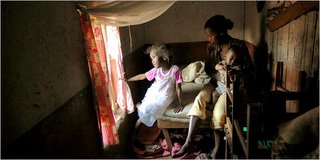 Via: NYtimes
Via: NYtimesSAMBAVA, Madagascar — Thirty miles outside this down-at-the-heels seaside town, Justin Betombo tends his vanilla plants and cheers the local soccer team as if he had not a care in the world. And in fact, what was once his greatest worry has been almost magically lifted from his shoulders. In the local prosecutor’s office, a file filled with accusations that he had sodomized his 9-year-old niece has vanished.
Mr. Betombo was arrested in 2003 after the girl, Kenia, said he had savagely assaulted her. The police obtained his confession, which he later recanted, and a doctor’s certificate that Kenia had been sexually violated, rendering her incontinent and anorexic. Twice they sent the case file to the prosecutor.
There matters ended. Mr. Betombo attended one hearing in the prosecutor’s office, but Kenia’s parents say they were not told about it. The records are nowhere to be found. And Mr. Betombo walked away a free man. Kenia’s parents, distressed by what they saw as a travesty of justice, asked that her name be published, hoping that her case would set an example.
Among sub-Saharan Africa’s children, such stories are disturbingly common. Even as this region races to adopt many of the developed world’s norms for children, including universal education and limits on child labor, one problem — child sexual abuse — remains stubbornly resistant to change.
Click here to read the entire article!
Monday, December 04, 2006
CIVIC ACTION FORUM MEETING & CAF DISCUSSION BOARD
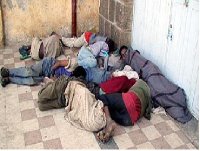 CIVIC ACTION FORUM MEETING & CAF DISCUSSION BOARD: GET INVOLVED TODAY!
CIVIC ACTION FORUM MEETING & CAF DISCUSSION BOARD: GET INVOLVED TODAY!Alif would like to invite you to its Civic Action Forum (CAF) that will convene this Friday, December 8th at 7PM. CAF is an action-oriented initiative that convenes monthly with the aim to move beyond mere dialogue and debate and into the development of tangible interventions to address critical issues faced by Ethiopia’s underserved and marginalized populations.
The location for the CAF meeting on Dec. 8th is Teachers College (Columbia University Campus) Russell Hall 3rd Floor, room 306.
Additionally, please join Alif online as it launches its online CAF Message Board for the Civic Action Forum (CAF). The six priority areas identified by the group are the following:
A Book Drive
The Hiwot (Life) Campaign
The Awakening Project
The Lalibela Project
Investing in Africa
Girls’ Education
The priority areas are not limited to these 6, thus your input is welcomed.
I hope to see each of you on both the CAF Discussion Board and at this weeks CAF meeting. Feel free to invite anyone you think might be interested in either of these action-oriented endeavors.
Click here to join the CAF Discussion Board
Sunday, December 03, 2006
THE AURA OF A PESSIMIST
 The Aura of a Pessimist
The Aura of a Pessimistby: Nasir Al-Amin
"The pessimist sees difficulty in every opportunity. The optimist sees the opportunity in every difficulty....” (Winston Churchill)
In times of difficulty, the optimist will spend his or her time thinking of ways to be an agent of change and the pessimist will spend his or her time talking! They both have a right to exist, but I also have the right to shield my soul and intellect from the aura of a pessimist, which siphons creativity, misguides the mind and cultivates a state of inertia.
“The world is a dangerous place, not because of those who do evil, but because of those who look on and do nothing....” (Albert Einstein)
Friday, December 01, 2006
A SINCERE COMMITMENT
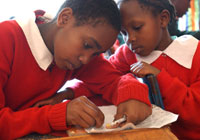 A SINCERE COMMITMENT ON WORLD AIDS Day
A SINCERE COMMITMENT ON WORLD AIDS DayAs we wind down from the arduous demands of this work week—appointments, assignments, travel and deadlines—let’s take a moment to reflect on what also occurred, albeit clandestinely:
This week in Ethiopia, approximately 5,000 new HIV infections will have been recorded, exacerbating an already dire situation marked by an estimated 2.8 million people infected and close to a million children orphaned by AIDS.
Twenty-five years after the first case of AIDS was recorded, let’s make World AIDS Day a day of commitment: a sincere commitment both in time and resources, to these 5,000 new HIV infections and a commitment to the 2.8 million people infected, as well as the children orphaned by AIDS. Ethiopia has one of the largest HIV/AIDS-affected populations in the world. The time to act is now!
Join Alif in its efforts to address the plight of orphans and vulnerable children in Ethiopia!
“Our lives begin to end the day we become silent about things that matter.”
(Martin Luther King Jr.)
Click here to make the Commitment Today!
Thursday, November 23, 2006
A Moment of Reflection on Thanksgiving
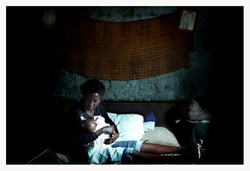 Thanksgiving & the Hiwot (Life) Campaign:
Thanksgiving & the Hiwot (Life) Campaign:by: Nasir Al-Amin
“Investing In Our Shared Future”
A Moment of Reflection on Thanksgiving
Thanksgiving offers not only a time for families and friends to gather, but also a time to remember and reflect on the vital possessions that we have such as food, shelter, health and physical security. Thus, as we end this day of gathering and reflection, lets take a moment to reflect on the plight of the 4.6 million orphans in Ethiopia; on the 30 percent of girls in Addis Ababa aged 10-14 that are not living with their parents, who were forced to run away from child marriages; lets reflect on the 8,000 sex workers that extreme poverty has forced into the sex trade; on the widowed mothers that earn $7.50 a month collecting trash, which is not enough to pay for food, rent and school fees. Make this Thanksgiving different, help Alif in its effort to contribute to a family’s effort to secure food, shelter and an education for their child.
Hiwot (Life) Campaign
Is an initiative to disengage 50 children from child labor, while simultaneously affording these 50 children with the opportunity to go to school and contribute financially to their family’s survival. Additionally, the cost of school fees, uniforms and school supplies are covered through the Hiwot Campaign, as well as each family is provided with $20 a month in an effort to aid them in securing their basic necessities: food, clothing and shelter.
Click here to join the Hiwot (Life) Campaign!
A Night of Networking and Purpose
 I would like to thank you all for joining Alif at Queen of Sheba Ethiopian Restaurant, for "A Night of Networking and Purpose,” on Saturday, November 18th in Alif's effort to raise awareness and funds for its Hiwot (Life) Campaign. The Hiwot (Life) Campaign is an initiative to send 50 orphans and vulnerable children to school in Ethiopia.
I would like to thank you all for joining Alif at Queen of Sheba Ethiopian Restaurant, for "A Night of Networking and Purpose,” on Saturday, November 18th in Alif's effort to raise awareness and funds for its Hiwot (Life) Campaign. The Hiwot (Life) Campaign is an initiative to send 50 orphans and vulnerable children to school in Ethiopia.Through your support Alif was able to raise enough funds to educate 4 children next year! Your contribution/investment to the Hiwot Campaign will have both an immediate and long-term effect on the life of a child and Ethiopia. The immediate effect of your contribution is actualized by a poor family’s ability to secure food, shelter and other basic necessities. The long-term effect, is seen in affording a child an education, which enhances a child’s and Ethiopia’s human capital, thus aiding in breaking the intergenerational transmission of poverty.
Again, I would like to extend a heartfelt thank you to all of you for attending and investing in a child’s life—Our Shared Future!
Sincerely,
Nasir
*Additionally, Alif would like to thank the owner of the Queen of Sheba Ethiopian Restaurant for affording Alif the opportunity to facilitate this event at the restaurant. For more information about Queen of Sheba click here!
Monday, November 06, 2006
Ethiopia: Steady increase in street children orphaned by AIDS
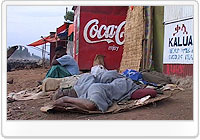 Via: UNICEF
Via: UNICEF“I have not seen one good thing about living on the street. Everything is horrible,”
(Mandefro Kassa, 14-year-old street child)
Ethiopia counts one of the largest populations of orphans in the world: 13 per cent of children throughout the country are missing one or both parents. This represents an estimated 4.6 million children – 800,000 of whom were orphaned by HIV/AIDS. The country has seen a steady increase in the number of children becoming orphaned because of AIDS. In the past, famine, conflict and other diseases were the main factors that claimed the lives of parents
Grim statistics
Many street children like Mandefro don’t have access to basic rights such as proper care, education, psychological support and supervision. Often, orphans and other vulnerable children are forced to work to earn an income. They are exposed to various forms of exploitation, including sexual exploitation.
In Addis Ababa more than 30 per cent of girls aged 10-14 are not living with their parents. Twenty per cent of these 30 per cent have run away from child marriages.
Twelve per cent of adolescents aged 10-14 – of the 30 per cent not living with their parents – surveyed in two areas of Addis Ababa were domestic workers. They are very young, very vulnerable to exploitation and abuse, and typically have no legal or social support.
In the Amhara region, the average age of marriage for girls is 14, while at the national level the mean age for marriage is 17. There are about 2.5 million children with disabilities.
No social net for vulnerable children
Very few government services help orphans. The primary coping strategy for communities has therefore been the extended family. Increasingly, however, the capacity of the extended family to support the growing numbers of orphans is declining.
“As more and more parents die, the capacity of the extended family to take care of orphans becomes smaller and smaller,” says Björn Ljungqvist, UNICEF Representative in Ethiopia. “In all countries where you have a big HIV/AIDS epidemic, at first you don’t see any orphans at all, as they are absorbed by the traditional systems. And then all of a sudden you seem to reach some type of breaking point and you start finding these children in the streets, you start finding them working in difficult conditions, you start finding even child-headed households.”
Click here to read entire article!
Meeting: Alif’s Civic Action Forum (CAF)
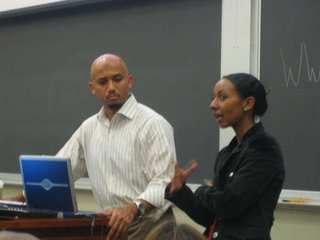 Alif would like to invite you to their Civic Action Forum (CAF) that will convene this Friday, November 10th at 7PM.
Alif would like to invite you to their Civic Action Forum (CAF) that will convene this Friday, November 10th at 7PM.CAF is an action-orientated initiative that convenes monthly with the aim to move beyond mere dialogue and debate and into the development of tangible interventions to address critical issues faced by Ethiopia’s underserved and marginalized populations.
Location:
Teachers College Main/Zankel Hall (Gottesman Library)
Room 306 (3rd Floor Russell Hall)
525 West 120th Street
Agenda
I. Open Floor Part I: Discussion on issues of interest.
(30 mins)
II. Open Floor Part II: Discussion of views on selected issues of interest.
(30 mins)
III. Group Formation: The establishment of groups based on common interest. (5 mins)
IV. Action: Development of action-orientated initiatives.
(30 mins)
V. Summation: Briefing from each group and agenda for next CAF (25 mins)
We look forward to seeing you this Friday!
*For more information contact Nasir at nasir@allianceinvestment.org
An Account of Street Life in Ethiopia (VIDEO)
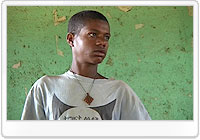 Via: UNICEF
Via: UNICEF“The street has been my home since I can remember. It’s been more than one year since I moved here (Bahr Dar) and all this time, I have not seen one good thing about living on the street. Everything is horrible,” says 14-year-old Mandefro Kassa, who grew up as an orphan on the streets of Woreta, a provincial town in Ethiopia.
Sunday, November 05, 2006
Forced Labor In a 6-Year-Old’s Eyes

Via: NY Times
KETE KRACHI, Ghana —
Just before 5 a.m., with the sky still dark over Lake Volta, Mark Kwadwo was rousted from his spot on the damp dirt floor. It was time for work.
Shivering in the predawn chill, he helped paddle a canoe a mile out from shore. For five more hours, as his coworkers yanked up a fishing net, inch by inch, Mark bailed water to keep the canoe from swamping.
He last ate the day before. His broken wooden paddle was so heavy he could barely lift it. But he raptly followed each command from Kwadwo Takyi, the powerfully built 31-year-old in the back of the canoe who freely deals out beatings. “I don’t like it here,” he whispered, out of Mr. Takyi’s earshot.
Mark Kwadwo is 6 years old. About 30 pounds, dressed in a pair of blue and red underpants and a Little Mermaid T-shirt, he looks more like an oversized toddler than a boat hand. He is too little to understand why he has wound up in this fishing village, a two-day trek from his home. But the three older boys who work with him know why. Like Mark, they are indentured servants, leased by their parents to Mr. Takyi for as little as $20 a year.
Until their servitude ends in three or four years, they are as trapped as the fish in their nets, forced to work up to 14 hours a day, seven days a week, in a trade that even adult fishermen here call punishing and, at times, dangerous.
Mr. Takyi’s boys — conscripts in a miniature labor camp, deprived of schooling, basic necessities and freedom — are part of a vast traffic in children that supports West and Central African fisheries, quarries, cocoa and rice plantations and street markets. The girls are domestic servants, bread bakers, prostitutes. The boys are field workers, cart pushers, scavengers in abandoned gem and gold mines.
By no means is the child trafficking trade uniquely African. Children are forced to race camels in the Middle East, weave carpets in India and fill brothels all over the developing world. The International Labor Organization, a United Nations agency, estimates that 1.2 million are sold into servitude every year in an illicit trade that generates as much as $10 billion annually.
Studies show they are most vulnerable in Asia, Latin America and Africa.
Africa’s children, the world’s poorest, account for roughly one-sixth of the trade, according to the labor organization. Data is notoriously scarce, but it suggests victimization of African children on a huge scale.
A 2002 study supervised by the labor organization estimated that nearly 12,000 trafficked children toiled in the cocoa fields of Ivory Coast alone. The children, who had no relatives in the area, cleared fields with machetes, applied pesticides and sliced open cocoa pods for beans.
Click here to read the entire article!
Forced Labor, In a 6-Year-Old’s Eyes
Photo journal: Ethiopia shoe-shine girl
Via: BBC
Interviews and photos: Amber Henshaw
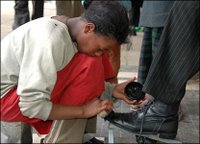 Easy
Easy
Meskerem, 12, is one of the few shoe-shine girls in Ethiopia's capital, Addis Ababa.
Her mother earns about $7.50 a month collecting rubbish, which is not enough to pay for food, rent and school fees.
At first Meskerem wanted to work as a domestic servant but she was advised to try shoe-shining. She likes being self-employed.
"Shoe shining is not difficult. It is easy for me because I have the power. If I want to work I can work," she says.
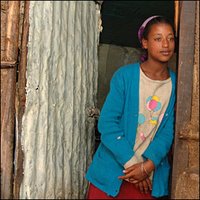 Shanty town
Shanty town
Meskerem lives with her mother, her uncle and four siblings in a one-roomed mud shack in the city centre.
It’s in a sprawling shanty area just behind the five-star Sheraton Hotel.
Meskerem’s father died just over a year ago.
Drunk
Meskerem’s mother, Bercha Yanaga, 29, says life was hard when Meskerem was younger.
"When she was a child I raised her in difficult conditions but now she’s growing up and helping me I feel so happy.
"My husband was a drunk and we were fighting about money all the time."
He died when Tigist, right, now two years old, was just a few months old.
Threats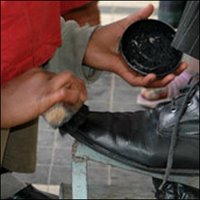
Meskerem shines shoes after school and all day at the weekend.
She charges 1 birr (11 US cents) to clean a pair of shoes. On a good day at the weekend she can earn between 5 to 7 birr.
"When I first started the boys came up to me and told me to go away," she says.
"They told me they would earn less because I was a girl and men would prefer to come to me. The boys threatened me. Sometimes customers and passers-by insult me and make me cry."
Long day
"I wake up just before 0700 and go to a food centre. If they have food I have breakfast, if not I just go home.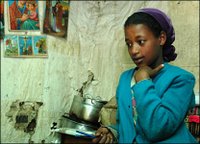
My mother leaves home for work at 0600 and gets back at 0800. I sweep the floor and do other chores until she returns.
Then I go to school until 12.30 and come home for lunch. If there’s lunch I eat, if not I go back to school for the afternoon session, which lasts until 1530.
Then I go home to collect my shoe shine boxes and work until 1800. Then I sleep.
Knowledge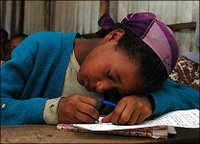
Meskerem uses some of the money she earns to pay her school fees - of 15 birr ($1.65) a month.
"I had to go to school because I want to get knowledge - knowledge is how you become somebody," she says.
She hopes to become a teacher one day.
Admire
The government and donors are trying to increase the number of girls who go to school in Ethiopia.
Muluembet Gebereyes is the head teacher at Meskerem's school.
"There are more girls than boys at this school, which is private," she says.
"The boys go to other schools and the girls go here because it is close to their homes. Parents worry about girls getting abducted [as brides] so they like to keep an eye on them. It is unusual for girls to shine shoes. I admire Meskerem very much.
Frightened
"Sometimes I play with my friends and my sister Guenet, 9, (far right)when I came back from work at the weekend.
"I am frightened that bad things will happen to me if I leave the compound, so I always stay here to play," Meskerem says.
"Once I tried to teach her how to shine shoes too and I wanted to buy her a box and some materials but she couldn’t do it, so I am the only one in the family shining shoes."
*Click here to see the rest of the pictures and interview!
Interviews and photos: Amber Henshaw
 Easy
EasyMeskerem, 12, is one of the few shoe-shine girls in Ethiopia's capital, Addis Ababa.
Her mother earns about $7.50 a month collecting rubbish, which is not enough to pay for food, rent and school fees.
At first Meskerem wanted to work as a domestic servant but she was advised to try shoe-shining. She likes being self-employed.
"Shoe shining is not difficult. It is easy for me because I have the power. If I want to work I can work," she says.
 Shanty town
Shanty townMeskerem lives with her mother, her uncle and four siblings in a one-roomed mud shack in the city centre.
It’s in a sprawling shanty area just behind the five-star Sheraton Hotel.
Meskerem’s father died just over a year ago.
Drunk

Meskerem’s mother, Bercha Yanaga, 29, says life was hard when Meskerem was younger.
"When she was a child I raised her in difficult conditions but now she’s growing up and helping me I feel so happy.
"My husband was a drunk and we were fighting about money all the time."
He died when Tigist, right, now two years old, was just a few months old.
Threats

Meskerem shines shoes after school and all day at the weekend.
She charges 1 birr (11 US cents) to clean a pair of shoes. On a good day at the weekend she can earn between 5 to 7 birr.
"When I first started the boys came up to me and told me to go away," she says.
"They told me they would earn less because I was a girl and men would prefer to come to me. The boys threatened me. Sometimes customers and passers-by insult me and make me cry."
Long day
"I wake up just before 0700 and go to a food centre. If they have food I have breakfast, if not I just go home.

My mother leaves home for work at 0600 and gets back at 0800. I sweep the floor and do other chores until she returns.
Then I go to school until 12.30 and come home for lunch. If there’s lunch I eat, if not I go back to school for the afternoon session, which lasts until 1530.
Then I go home to collect my shoe shine boxes and work until 1800. Then I sleep.
Knowledge

Meskerem uses some of the money she earns to pay her school fees - of 15 birr ($1.65) a month.
"I had to go to school because I want to get knowledge - knowledge is how you become somebody," she says.
She hopes to become a teacher one day.
Admire
The government and donors are trying to increase the number of girls who go to school in Ethiopia.
Muluembet Gebereyes is the head teacher at Meskerem's school.
"There are more girls than boys at this school, which is private," she says.
"The boys go to other schools and the girls go here because it is close to their homes. Parents worry about girls getting abducted [as brides] so they like to keep an eye on them. It is unusual for girls to shine shoes. I admire Meskerem very much.
Frightened
"Sometimes I play with my friends and my sister Guenet, 9, (far right)when I came back from work at the weekend.
"I am frightened that bad things will happen to me if I leave the compound, so I always stay here to play," Meskerem says.
"Once I tried to teach her how to shine shoes too and I wanted to buy her a box and some materials but she couldn’t do it, so I am the only one in the family shining shoes."
*Click here to see the rest of the pictures and interview!
Saturday, October 28, 2006
Launching of Hiwot (Life) Campaign
 I want to thank you all for attending the launching the Hiwot (Life) Campaign on Friday, October 27th, as the Hiwot Campaign is one stage in a vision I have to create change in the lives of orphans and vulnerable children in Ethiopia. The essence of this vision is to alter the lives of children who have brought clarity to my life.
I want to thank you all for attending the launching the Hiwot (Life) Campaign on Friday, October 27th, as the Hiwot Campaign is one stage in a vision I have to create change in the lives of orphans and vulnerable children in Ethiopia. The essence of this vision is to alter the lives of children who have brought clarity to my life.Through the Hiwot Campaign, Alif aims to send 50 orphans and vulnerable children to school next year. However, in addition to giving these 50 children the opportunity to obtain an education, the Hiwot Campaign’s dual impact, both an immediate and long-term effect on the lives of children and Ethiopia, is the vital component of the campaign.
This initiative provides poor family’s the ability to secure food, shelter and other basic necessities, which address the immediate impact of poverty. The long-term effect of the Hiwot Campaign, is seen in affording a child an education, which enhances a child’s and Ethiopia’s human capital, thus aiding in breaking the generational cycle/transmission of poverty.
Join the Hiwot Campaign and let’s change lives by investing in a child’s education and future!
I thank you again for attending and your interest in the Hiwot Campaign,
Nasir
Click here to join the Hiwot Campaign!
Sunday, October 22, 2006
ETHIOPIA: Nearly half of the children orphaned by HIV/AIDS
Via: PLUSNEWS
Ethiopia has one of the largest populations of orphans in the world with nearly half of the children having lost at least one of their parents. A government official said on Tuesday that HIV/AIDS, disease, hunger and poverty threatened to drive the number of orphaned children from 11 percent to 43 percent of the 45 million children in Ethiopia by 2010.
This could mean some 19 million children will have lost one or both of their parents, according to the figures, said Bulti Gutema, the head of the government's taskforce on the problem of orphans and vulnerable children. He said the figures were based on projections by the health ministry.
Bulti said antiretroviral drugs are vital in curbing the explosion but less than five percent got the drugs. Cheap antibiotics costing less than US $0.03 cents could also cut the numbers of child deaths from HIV/AIDS in the country by half but less than one per cent of the children got them, he added."This is a huge problem," he said at the launch of a new initiative to highlight the problem and bridge the massive funding gap that exists.
The UN Children's Fund (UNICEF) estimate that looking after each orphaned child in Ethiopia would cost around $300 a year, totalling some $1.38 billion. But the organisation has less than $10 million available even though Ethiopia has one of the largest populations of orphans in the world. Some 300,000 children already live on the streets, according to the UN body.Bjorn Ljungqvist, head of UNICEF Ethiopia said the scale of the crisis was daunting.
"It is easy to stand and look at the problem from a distance and wring our hands at how big and impossible the problem is," he said. "But we must confront this."
The warning came as UNICEF launched a global campaign focusing on the enormous impact of HIV/AIDS on children. Worldwide, fewer than five percent of HIV-positive children receive treatment and millions of children who have lost parents to the disease go without support. There are currently 4.6 million orphans in Ethiopia - with around 540,000 of them having been orphaned by the HIV/AIDS pandemic.
Ethiopia has one of the largest populations of orphans in the world with nearly half of the children having lost at least one of their parents. A government official said on Tuesday that HIV/AIDS, disease, hunger and poverty threatened to drive the number of orphaned children from 11 percent to 43 percent of the 45 million children in Ethiopia by 2010.
This could mean some 19 million children will have lost one or both of their parents, according to the figures, said Bulti Gutema, the head of the government's taskforce on the problem of orphans and vulnerable children. He said the figures were based on projections by the health ministry.
Bulti said antiretroviral drugs are vital in curbing the explosion but less than five percent got the drugs. Cheap antibiotics costing less than US $0.03 cents could also cut the numbers of child deaths from HIV/AIDS in the country by half but less than one per cent of the children got them, he added."This is a huge problem," he said at the launch of a new initiative to highlight the problem and bridge the massive funding gap that exists.
The UN Children's Fund (UNICEF) estimate that looking after each orphaned child in Ethiopia would cost around $300 a year, totalling some $1.38 billion. But the organisation has less than $10 million available even though Ethiopia has one of the largest populations of orphans in the world. Some 300,000 children already live on the streets, according to the UN body.Bjorn Ljungqvist, head of UNICEF Ethiopia said the scale of the crisis was daunting.
"It is easy to stand and look at the problem from a distance and wring our hands at how big and impossible the problem is," he said. "But we must confront this."
The warning came as UNICEF launched a global campaign focusing on the enormous impact of HIV/AIDS on children. Worldwide, fewer than five percent of HIV-positive children receive treatment and millions of children who have lost parents to the disease go without support. There are currently 4.6 million orphans in Ethiopia - with around 540,000 of them having been orphaned by the HIV/AIDS pandemic.
ETHIOPIA: Poverty forcing girls into risky sex work
Via: IRIN
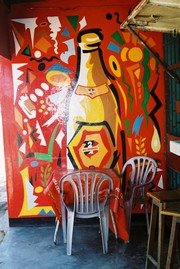 The nightclubs of the Ethiopian capital, Addis Ababa, reveal a thriving sex industry, in which thousands of skimpily dressed young women trade sexual favours for cash to survive, putting them at risk of contracting HIV and spreading the disease.
The nightclubs of the Ethiopian capital, Addis Ababa, reveal a thriving sex industry, in which thousands of skimpily dressed young women trade sexual favours for cash to survive, putting them at risk of contracting HIV and spreading the disease.
Extreme poverty has forced many girls into the sex trade. Helen Chane (not her real name), a grade 10 student aged 17, became a commercial sex worker after her parents died from AIDS-related illnesses about a year ago.
"I support my grandmother and sister; I sleep with students during the day and I have customers that I find through brokers at night," she said. "I do not need to go to the street, the brokers bring them to me."
Sex work in Addis is usually linked to establishments such as restaurants, bars, hotels and nightclubs frequented by wealthy expatriates or local businessmen, but the city also has residential houses that function as unlicensed brothels.
According to a 2002 census in Addis by the American healthcare agency, Family Health International (FHI), 8,134 establishment-based sex workers were identified in the capital, 60 percent of whom were aged between 15 and 24. Clients are increasingly targeting high school students, domestic workers and even children - the perception is that these groups are less likely to have the HI virus than those openly selling sex.
Click here to read the entire article!
 The nightclubs of the Ethiopian capital, Addis Ababa, reveal a thriving sex industry, in which thousands of skimpily dressed young women trade sexual favours for cash to survive, putting them at risk of contracting HIV and spreading the disease.
The nightclubs of the Ethiopian capital, Addis Ababa, reveal a thriving sex industry, in which thousands of skimpily dressed young women trade sexual favours for cash to survive, putting them at risk of contracting HIV and spreading the disease.Extreme poverty has forced many girls into the sex trade. Helen Chane (not her real name), a grade 10 student aged 17, became a commercial sex worker after her parents died from AIDS-related illnesses about a year ago.
"I support my grandmother and sister; I sleep with students during the day and I have customers that I find through brokers at night," she said. "I do not need to go to the street, the brokers bring them to me."
Sex work in Addis is usually linked to establishments such as restaurants, bars, hotels and nightclubs frequented by wealthy expatriates or local businessmen, but the city also has residential houses that function as unlicensed brothels.
According to a 2002 census in Addis by the American healthcare agency, Family Health International (FHI), 8,134 establishment-based sex workers were identified in the capital, 60 percent of whom were aged between 15 and 24. Clients are increasingly targeting high school students, domestic workers and even children - the perception is that these groups are less likely to have the HI virus than those openly selling sex.
Click here to read the entire article!
Subscribe to:
Posts (Atom)




